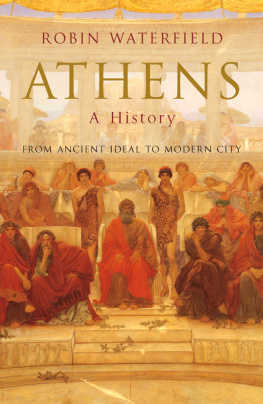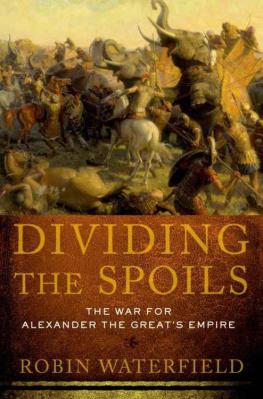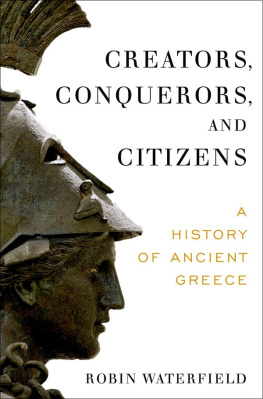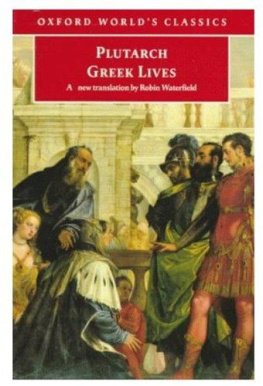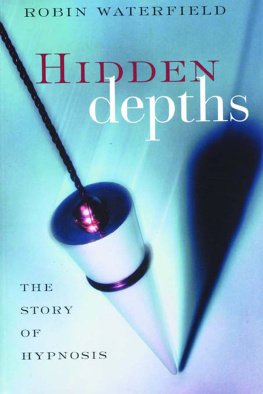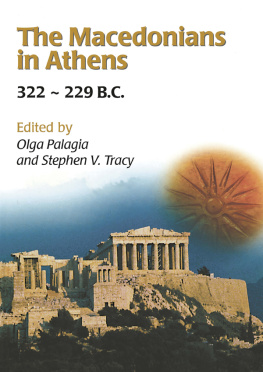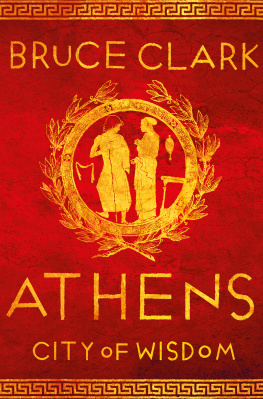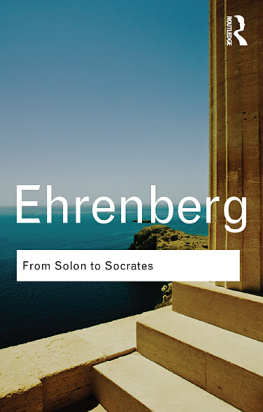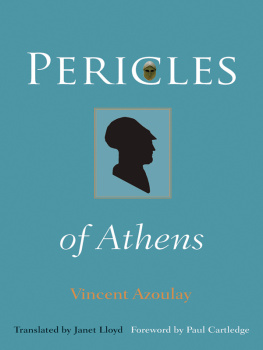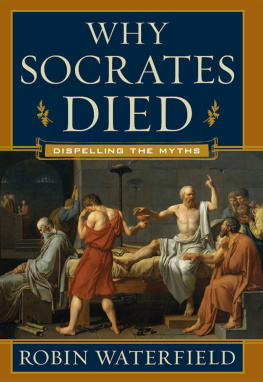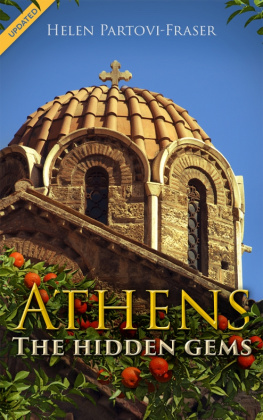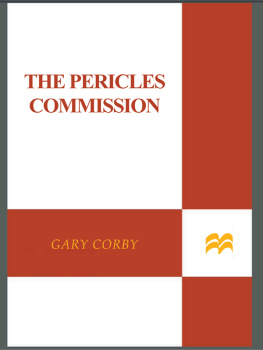
For Ingrid, with love
There is no end to it in this city: wherever we walk, we set our feet upon some history.
Lucius Cicero to his cousin Marcus, 79 BCE
Whereer we tread, tis haunted, holy ground;
No earth of thine is lost in vulgar mould,
But one vast realm of Wonder spreads around,
And all the Muses tales seem truly told,
Till the sense aches with gazing to behold
The scenes our earliest dreams have dwelt upon.
Lord Byron, Childe Harolds Pilgrimage
A Greek landscape does not give us if we know how to listen and how to love an innocent tremor of beauty. The landscape has a name, it is bound up with a memory here we were shamed, here glorified; blood on sacred statues rises up from the soil, and all at once the landscape is transformed into rich, all-encompassing history, and the Greek pilgrims whole spirit is thrown into confusion.
Nikos Kazantzakis, Travels in Greece
Introduction
In 1912, in his essay The Future of Constantinople, Joseph Conrad wrote that Athens was matchless in the wonders of its life and vicissitudes of its history. It was and still is a wonderful place, and its history has indeed been extraordinary. However many times I visit it, there is always something new to surprise me; however long I study its history, there are always new angles and quirks and possibilities to explore. The purpose of this book is to trace the life of the city of Athens, from its earliest beginnings up to relatively recent times, with the intention not of expounding a grand thesis but of telling a story or rather of telling several stories, because no city is so monolithic that it offers only one throughout its history.
As a glance at the Contents of the book reveals, I have spent a disproportionate amount of time on the ancient city. There are good reasons for this: there is far more evidence for the ancient city, up to the end of the fourth century BCE (I use BCE and CE , not BC and AD ) than there is for the next 2,100 years; and in 1834 CE Athens became the capital city of the new nation-state of Greece, so that the history of the city merged with the history of the country, which is another book altogether. I have therefore dealt with the era since 1834 in some haste, although up until then I have been reasonably thorough.
Just as important as lack of evidence in dictating this strategy is the fact that the ancient city is what most people think of when they hear the word Athens. Yes, recent visitors will have other memories and associations: the old airport with its uncomfortable seating and lack of air conditioning, the traffic, the smog, the friendly locals and cheap restaurants, the taste of ouzo with the sunlight filtering through a shady vine. But the chances are that they went there to visit the antiquities the sites and the outstanding museums and for thousands of others too, who have never had the chance to travel there, Athens represents one of the high points of ancient culture. Within the two centuries of its greatest and most glorious period, Athens sowed the seeds of Western culture in art, architecture, painting, sculpture and drama, both serious and humorous. What is more, it did so under the most unlikely circumstances: it was too small, one would think, to have produced so many geniuses in such a short space of time, and it was beset by the radical instabilities of the ancient Greek world, where warfare, disease, drought and malnutrition were all too familiar.
Above all, the Classical city practised a form of direct democracy which has been held up over the centuries as a model of perfection or a recipe for disaster. Political theorists have always looked to ancient Athens to help them make up their minds about where exactly on the political spectrum they want to stand. Recent debates about American democracy have also often found it useful to take ancient Athenian democracy as a starting point, and to ask, How near or far do we want to be to that system?
This book contains, then, a selective history of Athens enough to give the reader a good idea of the main events, while avoiding the controversies and academic debates which are thrown up by the frequently ambiguous or even downright contradictory evidence. One of the main reasons the history of Athens is so enjoyable is that it has been driven from start to finish by a number of powerful and fascinating individuals: Solon, the poet-statesman who was held to have founded Athenian democracy; Peisistratos, the tyrant of Athens who developed the citys potential as a centre of culture; the cunning Themistokles, who championed the Athenian navy and so played a key role in repulsing the Persians; Perikles, the leader of the city at the height of its power and splendour. Then in post-Classical times, we find a string of influential foreigners, from Romans up to the English poet Lord George Byron, who died during Greeces war of liberation against Turkey, and Lord Thomas Elgin, who plundered the Parthenon. The stories of these men and of others (men and women) feature here alongside the hard historical facts and events they initiated. Throughout the book we will see, implicitly and explicitly, that the engine of history is often the whims and personalities of powerful men and women, as much as economic or other impersonal forces.
This emphasis on personalities has often been criticized: in the case of ancient Athens, historians have been reluctant to rely too much on the personality-focused histories of the Greeks themselves, who were little concerned with broader historical factors, such as economics. But in fact the emphasis is true for much Athenian history. Athens was, by our standards, a small town, where everyone knew everyone else and personal reactions and relations were important. Moreover, there were no political parties in ancient Athens. Laws were proposed by individuals in pursuit of their own vision. Of course, it was often the case that one mans vision was similar to that of a predecessor or colleague, but this still falls short of party politics.
Then there was the unique institution of ostracism. Once a year the people had the option (which they did not necessarily take up) of sending a prominent person into exile for a maximum period of ten years. Whenever the option was taken up, threatened individuals became rivals, each trying to ensure that someone else was ostracized. Nothing could more clearly show the individualistic nature of politics in ancient Athens. Nowadays, if a prominent politician departs, another steps up to continue the partys programme; in Classical Athens, each politician had his own programme, which he saw through in the first instance with the help of a few friends.
Of course, this is not to say that Athenian politics was led entirely by a few individuals. Ancient Athens was, for the 200 years of its prominence, a participatory democracy, and individual politicians could not see their visions through without the support of the mass of the population, who were politicized to a remarkably high level. During this critical period of Athenian history, progress was made by means of debate and dialectic between the masses and the members of an elite. The city had, in a sense, a mixed constitution where both the people and the elite had to take account of each others desires and objectives.
The history of Athens is, as I said, informed by a number of stories. The architecture of this book is constructed largely out of two, though the two are closely related. The first six sections of the book tell an epic and moral tale, of how from humble beginnings the city rose to greatness and fell due to arrogance. Athens epitomizes the condition of all assertive and successful states that overreach themselves in the belief of their own essential superiority. She was the only city in ancient Greece which could have fostered cooperative values, but she deliberately turned her back on them. I portray the citys rise and fall as a tragedy, and as the gradual betrayal of the kind of values represented in the ancient Greek world by the Olympic ideal. The final sections of the book tell how the city learnt to cope with the tensions created by the painfully clear contrast between an awesome past and a diminished present.
Next page
